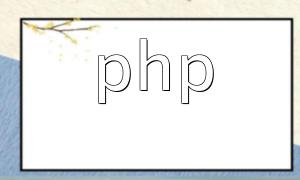When dealing with large-scale web applications, cross-table and cross-database queries often become performance bottlenecks. Frequent joins and cross-database access can consume significant resources and slow down response times. This article discusses how to use indexing, query optimization, and caching techniques to enhance PHP and MySQL performance in complex query scenarios.
Indexes are the foundation of database performance optimization. They create efficient data structures that allow fast data retrieval and eliminate full table scans. In cross-table or cross-database queries, proper indexing can greatly reduce query latency.
For example, when performing a join between two tables, creating a composite index on the related columns can improve performance:
<span class="fun">CREATE INDEX index_name ON table1 (column1, column2);</span>
For cross-database queries, it is recommended to use globally unique identifiers (GUIDs) as primary keys instead of auto-increment IDs. GUIDs provide global uniqueness, which helps maintain stable and efficient cross-database queries.
Beyond indexing, query structure plays a critical role in performance. Here are several proven optimization techniques:
Use JOIN instead of multiple separate queries. In many cases, developers run multiple queries and merge results in PHP, which can significantly burden the database. Using JOIN combines operations into a single query, for example:
<span class="fun">SELECT * FROM table1 JOIN table2 ON table1.column = table2.column;</span>
Ensure that fields in the WHERE clause are indexed. This allows the database to locate target rows directly instead of scanning entire tables.
If only a portion of the results is needed, apply LIMIT to reduce data transfer and memory usage. For example:
<span class="fun">SELECT id, name FROM users WHERE status = 1 LIMIT 50;</span>
Avoid using SELECT *. Selecting only the necessary columns reduces bandwidth and parsing overhead, leading to faster execution.
Caching is another effective way to improve system performance. In applications that frequently perform cross-table or cross-database queries, caching can significantly reduce the number of database accesses by storing query results for reuse. Here’s an example using PHP caching:
// Store query result in cache
$result = $cache->get('query_result');
if (!$result) {
$result = $db->query('SELECT * FROM table');
$cache->set('query_result', $result, 3600); // cache for one hour
}
// Retrieve from cache
$result = $cache->get('query_result');The cache expiration strategy should be tailored to the data update frequency. When data changes, the cache must be refreshed to maintain consistency. Frequently accessed data can have a longer cache duration, while time-sensitive data should be updated more frequently.
By combining index optimization, streamlined SQL queries, and effective caching mechanisms, developers can significantly boost PHP and MySQL performance in complex data operations. The goal of optimization is not only to speed up queries but also to make the entire system more stable and efficient. In real-world projects, it’s essential to test and adjust strategies based on specific use cases to achieve the best performance results.









